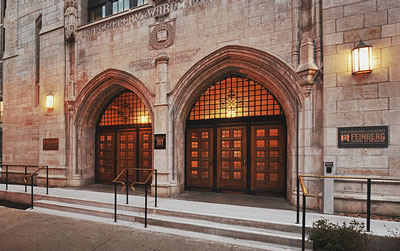Author: kwm107
-

McNally, Khan Honored by American Heart Association
Elizabeth McNally, MD, PhD, director of the Center for Genetic Medicine and Sadiya Khan MD, MSc, instructor of Medicine in the Division of Cardiology, were recently honored by the American Heart Association for their achievements in cardiovascular disease research.
-

Transcription Factor Responsible for Variability in Congenital Brain Disorder
Northwestern Medicine scientists have identified one of the molecular mechanisms behind the variability of holoprosencephaly, a congenital brain malformation.
-

Investigating the Molecular Roots of Lung Disease
Chief Scott Budinger, MD, and the other scientists in Pulmonary and Critical Care Medicine tackle some of the most common — and fatal — medical conditions in the world.
-

Linder Joins Northwestern as Chief of General Internal Medicine
Jeffrey Linder, ’97 MD, MPH, will join Northwestern as the new chief of General Internal Medicine and Geriatrics.
-

Taiwo to Lead Division of Infectious Diseases
Babafemi Taiwo, MBBS, ’06 GME, has been named chief of Infectious Diseases in the Department of Medicine.
-

Sweet Spot for Pain Relief Identified
New research from Northwestern Medicine and the Rehabilitation Institute of Chicago scientists has identified the brain region responsible for the placebo response to pain.
-

Understanding Chromatin’s Cancer Connection
Northwestern Medicine scientists have developed a new way to image chromatin within living cells, opening the door to large-scale screening techniques, including for cancer.
-

Enzyme Identified as Target Against Triple-Negative Breast Cancer
Northwestern Medicine scientists identified an enzyme as a potential new target for triple-negative breast cancer, a form of breast cancer that is associated with early tumor recurrence and significantly increased mortality rates.
-

Imaging Stroke Risk in Four Dimensions
Research from McCormick School of Engineering and Northwestern Medicine scientists describes new MRI technique that can detect blood flow velocity to identify who is most at risk for stroke.
-

Muscles Have Circadian Clocks That Control Exercise Response
Northwestern Medicine scientists have discovered circadian clocks in muscle tissue that control the muscle’s metabolic response and energy efficiency depending on the time of day.






